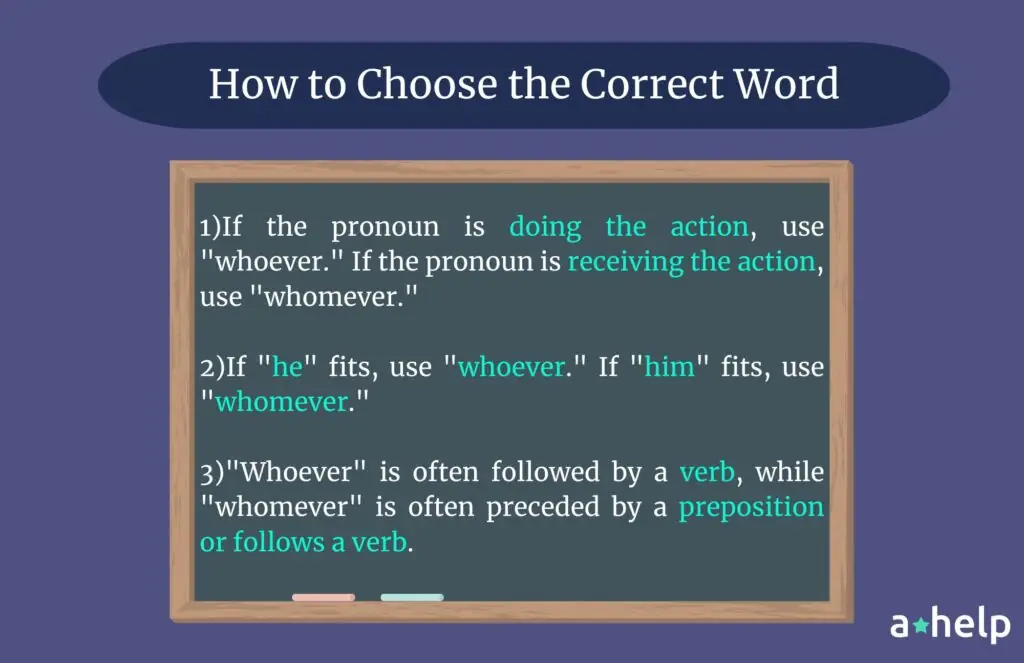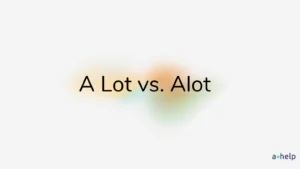The words “whoever” and “whomever” often cause confusion among English language learners and even native speakers. Both are pronouns, but they serve different roles in sentences.

✅ AI Essay Writer ✅ AI Detector ✅ Plagchecker ✅ Paraphraser
✅ Summarizer ✅ Citation Generator

Subject and Object Pronouns
In English grammar, pronouns are words that take the place of nouns. There are two types of pronouns that are often confused: subject pronouns and object pronouns. “Whoever” is a subject pronoun, which means it is used as the subject of a verb in a sentence.
For example, in “Whoever made the cake did a great job,” “whoever” is the subject performing the action of making the cake.
On the other hand, “whomever” is an object pronoun, which means it is used as the object of a verb or preposition.
For example, in “Give the award to whomever you think deserves it,” “whomever” is the object of the preposition “to.”
Subject pronouns perform the action in a sentence, while object pronouns receive the action or are the object of a preposition. Check out a grammar corrector to make sure you are writing everything correctly.
Rules for Using “Whoever” and “Whomever”
When deciding between “whoever” and “whomever,” it’s important to understand their roles in a sentence. Here are two simple rules to help you choose the correct pronoun:
Rule 1: Use “whoever” when it is the subject of a verb.
“Whoever” is used as a subject pronoun, which means it should be used when the pronoun is the one doing the action in the sentence. For example:
📌 “Whoever answers the question correctly will win a prize.” (Here, “whoever” is the subject of the verb “answers.”)
Rule 2: Use “whomever” when it is the object of a verb or preposition.
“Whomever” is used as an object pronoun, which means it should be used when the pronoun is receiving the action of the verb or is the object of a preposition. For example:
📌 “Give the book to whomever you think will enjoy it the most.” (Here, “whomever” is the object of the preposition “to.”)
📌 “I will listen to whomever speaks the truth.” (Here, “whomever” is the object of the verb “listens.”)
By following these rules and understanding the role of the pronoun in the sentence, you can confidently choose between “whoever” and “whomever.” Remember, the key is to identify whether the pronoun is acting as the subject or the object in the sentence.


To Sum Up
The correct use of “whoever” and “whomever” is an important aspect of English grammar. “Whoever” is used as a subject pronoun, while “whomever” serves as an object pronoun. After learning the simple rules and practicing with examples, you can confidently choose the right pronoun for your sentences.
FAQ
Follow us on Reddit for more insights and updates.





Comments (0)
Welcome to A*Help comments!
We’re all about debate and discussion at A*Help.
We value the diverse opinions of users, so you may find points of view that you don’t agree with. And that’s cool. However, there are certain things we’re not OK with: attempts to manipulate our data in any way, for example, or the posting of discriminative, offensive, hateful, or disparaging material.